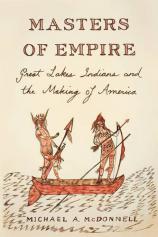Masters of Empire: Great Lakes Indians and the Making of America
Review
Masters of Empire: Great Lakes Indians and the Making of America
MASTERS OF EMPIRE endeavors to detail our country’s colonial history from the perspective of Native Americans. Author Michael McDonnell emphasizes his desire to present a native-driven narrative throughout. This is a critical and long-overdue enterprise, as our history books are and always have been written by the victors, which skews and propagandizes the truths of our country’s foundations. Too long have we only taught the timelines and cultures of the colonies.
Without understanding what existed on this land physically and socioculturally before invaders irrevocably altered its nature, we continue to exist dangerously ignorant of our Native forebears, and the atrocities committed that established white supremacy in this nation. Without understanding history from a Native perspective, we cannot understand our relationships with Native peoples today, nor our own roles in the longstanding and ongoing erasure of Native peoples and cultures. MASTERS OF EMPIRE is a necessary reaction to American history that stereotypes, misrepresents, misunderstands, oppresses and erases Native America.
"MASTERS OF EMPIRE does a substantial amount of good. It recognizes the need for reestablishing our understanding of history. It is an engaging and crucial narrative with noble intentions."
McDonnell intersperses maps and images throughout, and the visual representation enhances the narrative. His writing edges on dull at times, but viscerally engaging at others --- overall a riveting telling of an expansive portion of history. He delves into great detail, though he centers his scenes on research rather than speculation. The volume of detail, coupled with the visuals, crafts a rich and informative history. McDonnell takes care to present every conflict and cultural moment from all the relevant perspectives involved: Odawa, Anshinaabe, French, English, colonizers, etc., which constructs a more sensitive and accurate narrative than most books on the era.
McDonnell emphasizes not only the importance of a Native perspective, but also Native/European cultural distinctions, Native traditions, and the emerging stereotypes that disrupted trade and political ties as well as informed our own racism towards Native peoples. He establishes early on, for example, that many factions of the Odawa operated on a “flesh for flesh” system, meaning that they would seek vengeance if one of their own was harmed. European misunderstanding of this and many other traditions led to brutal bloodshed. McDonnell also demonstrates how Native stereotypes emerged out of British anxieties: stereotypes of drinking and violence arose due to social mores and the Great Victorian fear of internal savagery. He stresses that the colonialists --- European and French alike --- never would have survived without the intellect, kindness and selflessness of the Native peoples.
Still, MASTERS OF EMPIRE would have benefited from including perspectives of current Native American descendants --- an absence amplified by McDonnell’s insistence that this is meant to be told “from the Native perspective,” as it greatly privileges Western quotes over Native narratives. Given his goals, it’s striking to note that all (or at least most, ostensibly) reviewers for this title --- myself included --- are non-Natives. More worrisome, so are the majority of his sources. Though it’s clear that availability plays a factor, that alone should be a striking klaxon towards the point this book does not make, and inadvertently thus does so: In McDonnell’s efforts to emphasize that Native peoples were not helpless, he does a disservice to the ones who were, and the ones who are today. We are still speaking for them. We are still speaking over them. It is true that Native peoples played a far larger role in our history than simply feeding Europeans and getting murdered, and that the Great Lakes Natives are studied far less than their further-East counterparts. Yet ultimately, McDonnell centers their importance on the fact that they, in many ways, catalyzed the American Revolution and other critical points of our established history.
I closed this book and tilted my head in confusion because, of course, the true catalysts were us. The Europeans, the invaders --- McDonnell’s perspective accepts Eurocentrism as a given. What of the impacts we had on their empire? McDonnell takes care to sensitively include Native rituals and traditions --- yet few scholars truly expand on what exactly America lost when and as we continually dismiss and erase them. What would this book look like if it were written by a descendant of one of the Odawa tribes? They exist today, but we don’t recognize their authority. Who else has the authority to tell the truth about the catalyst invaders, but those who were here before we changed everything?
MASTERS OF EMPIRE does a substantial amount of good. It recognizes the need for reestablishing our understanding of history. It is an engaging and crucial narrative with noble intentions. I can only hope that it readies the market for many further titles of history from a Native perspective.
Reviewed by Maya Gittelman on December 18, 2015
Masters of Empire: Great Lakes Indians and the Making of America
- Publication Date: December 13, 2016
- Genres: History, Nonfiction
- Paperback: 416 pages
- Publisher: Hill and Wang
- ISBN-10: 0809068001
- ISBN-13: 9780809068005




